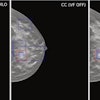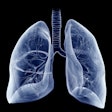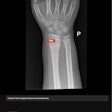In recent years, a number of sports have introduced new technology at the elite level with the intention of producing a "fairer" game, less prone to the inconsistencies inherent in human refereeing or umpiring. Rugby has its "Television Match Official (TMO)," cricket its "Decision Review System (DRS)," and football its "Video Assistant Referee (VAR)."
To the surprise of many pundits and commentators, the introduction of this new technology has not been without problems, and in fact the unforeseen negative consequences have even led some to call for its abandonment. The clamor has been loudest in football, probably due to the global reach of the game and the greater sums of money involved.
 Dr. Giles Maskell. Photo courtesy of European Society of Breast Imaging.
Dr. Giles Maskell. Photo courtesy of European Society of Breast Imaging.
What has this to do with radiology? Well, we too are on the cusp of introducing new technology into our working practices in the form of AI and machine learning (ML), and it seems reasonable at least to wonder whether there might be any similarities.
The first clear parallel lies in the unrealistic expectations of what new technology might deliver. Many in the world of football seem to have expected refereeing errors to be effectively eliminated by the introduction of VAR, but this has not been the experience so far. Not only is the technology itself susceptible to malfunction but also the interface between the human and the machine provides a fertile new source of error with numerous examples of the human referee misinterpreting or incorrectly overriding the output of the machine.
Could this happen in radiology? Of course. Every new technology brings with it new sources of error and AI/ML will be no different. Radiologists are rightly wary of claims by vendors that their algorithms do not make mistakes. Perfection will remain unattainable.
The second objection commonly raised against the use of VAR in football concerns interruption to the flow of the game. Traditionally a decision -- right or wrong -- is made rapidly by the referee and the game moves on. The use of VAR can involve the introduction of a long delay between an incident occurring and the game restarting.
Obviously, I am not suggesting that radiology is a "game," but experienced radiologists will recognize that "flow" is an important concept in reporting imaging studies. We develop systems for the interrogation of each common type of study that allow us to become remarkably efficient and productive. Presentation of images in an unfamiliar sequence -- or the addition of unexpected extra datasets, not always contemporaneous with the base images -- is bound to interrupt our flow. This can lead to a reduction in reporting speed and efficiency as well as a potential increase in the likelihood of error.
The final parallel I would like to draw concerns the ability to use discretion. The introduction of VAR in football has led to multiple revisions of the rules of the game – the rules governing handball are one example – in order to allow an official in a location remote from the game to make a decision based on an image on a screen. Previously such decisions were made almost instantaneously by the referee on the pitch and relied on his or her "feel" for the game to determine what might be the correct course of action in line with the spirit as well as the letter of the law.
Does this have any relevance to radiology? We radiologists, like other humans, vary in our attitude to rules. Some of us like to be guided every step of the way, taking the pain out of every tricky decision by having an easy-to-follow pre-ordained pathway. Others take a different approach, relishing the ability to exercise judgment in deciding whether the rules apply in a particular case or not and looking out for those occasions on which the normal rules might not apply. In my view, this ability to make judgments as to whether the general rules apply in an individual case is fundamental to our role as doctors. It is a large part of what distinguishes us from other healthcare professionals -- and, for that matter, from computers.
I am well aware that I am stretching a point by drawing comparisons between radiology and football and may even cause offense, but the message that the introduction of new technology can have unexpected consequences should not come as a surprise to anybody.
In football, it appears that a degree of refereeing discretion is an essential feature of the game. If we too are driven by technology towards unwavering adherence to rules and guidelines, something may be gained but something important will as surely be lost.
Dr. Giles Maskell is a consultant radiologist at Royal Cornwall Hospitals National Health Service (NHS) Trust, Truro, U.K. He is a former president of the U.K. Royal College of Radiologists. Competing interests: None declared.
The comments and observations expressed herein do not necessarily reflect the opinions of AuntMinnieEurope.com, nor should they be construed as an endorsement or admonishment of any particular vendor, analyst, industry consultant, or consulting group.



















